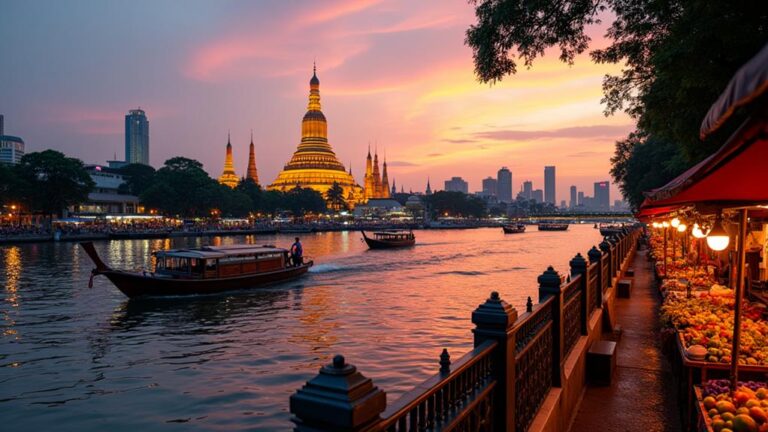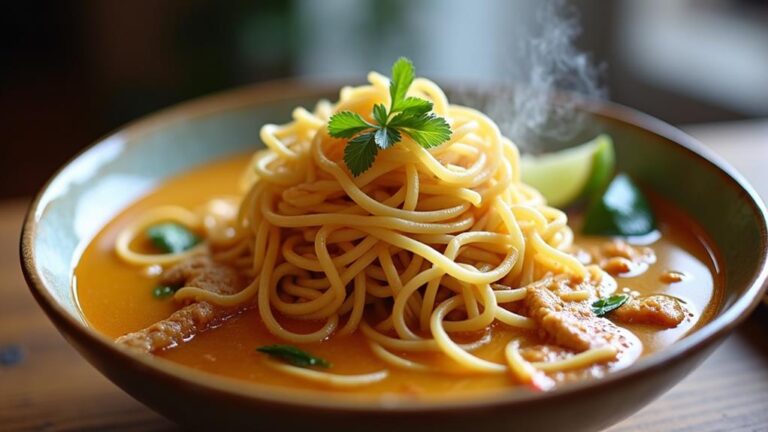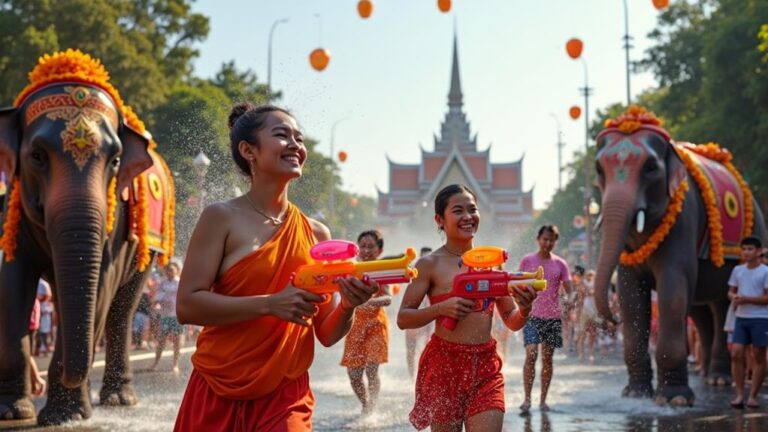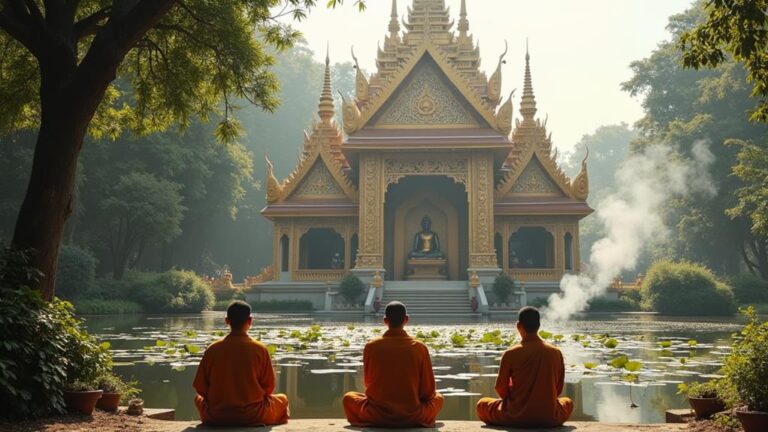When choosing between Thailand and Bali, you'll encounter three key differences. First, cultural experiences vary significantly, with Bali showcasing Hindu traditions and intricate arts, while Thailand immerses you in Buddhist temples and vibrant festivals. Second, landscapes differ dramatically: Bali offers volcanic mountains, lush jungles, and iconic rice terraces, whereas Thailand boasts pristine beaches and limestone cliffs. Finally, culinary adventures diverge, with Thai cuisine featuring bold street food and aromatic dishes like Pad Thai, while Balinese cuisine presents a unique fusion of flavors in specialties such as Babi Guling. Each destination promises a distinct journey, beckoning you to explore their unique charms further.
Table of Contents
Key Takeaways
- Thailand is predominantly Buddhist, while Bali is primarily Hindu, influencing cultural experiences and attractions.
- Thai cuisine features bold flavors and street food culture, whereas Balinese cuisine offers a unique fusion of influences.
- Thailand boasts extensive coastlines and beaches, while Bali's landscape focuses more on inland beauty and rice terraces.
- Thailand offers diverse destinations from bustling cities to islands, whereas Bali is a single island with varied experiences.
- Thai temples are often gilded and ornate, while Balinese temples feature intricate stone carvings and unique architectural styles.
Cultural Experiences and Traditions
When it comes to cultural experiences and traditions, Thailand and Bali offer distinctly different flavors. In Bali, Indonesia, you'll immerse yourself in a primarily Hindu culture, evident in the island's unique traditional dances and rituals. The Balinese are renowned for their arts and crafts, showcasing intricate wood carvings and vibrant batik textiles that reflect their rich heritage.
On the other hand, Thailand's cultural landscape is deeply rooted in Buddhism. You'll encounter this influence in the country's stunning temples, colorful festivals, and daily practices of its people. While exploring Thailand, you'll have the opportunity to witness monks' alms-giving ceremonies and participate in traditional Buddhist celebrations.
Both destinations promise unforgettable cultural experiences, but they cater to different interests. In Bali, you'll find yourself drawn to Hindu ceremonies and artistic expressions, while Thailand offers a glimpse into Buddhist traditions and spirituality.
Food also plays a significant role in these cultural experiences. You'll savor aromatic dishes like Pad Thai and Tom Yum Goong in Thailand, while Bali tempts you with its unique Balinese cuisine, reflecting the island's Hindu influences and local ingredients.
Landscape and Natural Attractions
From towering volcanoes to pristine beaches, Thailand and Bali offer strikingly different landscapes that cater to diverse traveler preferences.
In Bali, you'll be captivated by the iconic volcanic mountains like Mount Agung, which dominate the skyline and create a dramatic backdrop for your adventures. The island's lush jungles and stunning rice terraces, such as the Tegallalang Rice Terraces, provide a unique and picturesque setting for nature lovers and photographers alike.
Thailand, on the other hand, boasts a landscape characterized by its crystal clear waters and white sandy beaches. You'll find yourself mesmerized by the picturesque limestone cliffs in destinations like Krabi and Phuket, which offer a stark contrast to Bali's terraced hills. Thailand's natural attractions are diverse, ranging from the turquoise waters of Phi Phi Islands to the golden beaches of Koh Samui.
While both destinations offer breathtaking scenery, Bali's landscape is more focused on inland beauty, with its serene waterfalls like Sekumpul and Tegenungan.
Thailand's natural allure lies primarily in its coastal areas and islands, making it a paradise for beach enthusiasts and water sports aficionados.
Cuisine and Culinary Adventures
Three distinct culinary worlds await you when comparing Thai and Balinese cuisines. Thai cuisine bursts with bold flavors, aromatic spices, and fresh herbs like lemongrass and basil. You'll be captivated by Thailand's vibrant street food culture, where you can savor iconic dishes such as Pad Thai, Tom Yum soup, and Som Tum (papaya salad) on every corner.
Indonesian cuisine, on the other hand, offers a unique fusion of flavors influenced by Chinese, Indian, and European cooking styles. Bali's culinary scene showcases this diversity with specialties like Babi Guling (suckling pig) and Lawar, a traditional minced meat dish bursting with local spices.
Both destinations provide immersive experiences through cooking classes, allowing you to dive deep into their food cultures. You'll learn to prepare authentic dishes and understand the intricate balance of flavors that make each cuisine special.
Whether you're indulging in Thailand's aromatic street food or savoring Bali's unique culinary creations, both destinations promise unforgettable gastronomic adventures. Each offers a distinct flavor profile and culinary tradition that will tantalize your taste buds and expand your culinary horizons.











